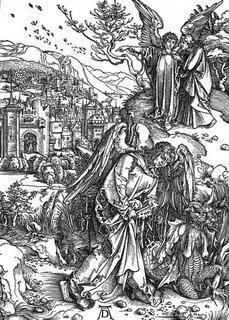Angels, Demons, and Barth

"Angels we have heard on high …. Gloria in excelsis Deo!"
"Christian dost thou see them on the holy ground, how the powers of darkness compass thee around?"
I came across an old Theology Today article - Angels Heard and Demons Seen by Gabriel Fackre, Abbot Professor of Christian Theology at Andover Newton Theological School - which discusses angels and demons in both popular culture and theology, andI uses the help of Karl Barth to find a path between "the Scylla of New Age angelogies and the Charibdis of Enlightenment orthodoxies". The article quotes Barth ...
Our reference is . . . to the Christian use of the term "angel." What has been meant and thought and written and maintained and taught in both ancient and more modern times concerning the being and existence and activity of the possible hypostases and mediators of other gods, we commit into the hands of the inventors and adherents of the relevant systems and messages and writings in which these figures occur. We are obviously unable to prevent them using the term "angel" for what they think they may know and accept and believe in this respect. We insist, however, that whatever lies to the right hand or to the left of the reality whose concept is decisively given by its relationship to the living active and revealed God of Holy Scripture, does not correspond to the Christian idea of angel and does not deserve to be called an angel according to the Christian use … including … angels of so many mythical, spiritualistic, occult, theosophical and anthroposophical systems … those of popularly fantastic imagination of so many individual dreamers or whole circles of such. Nor are the beings which under this name have met with so much ridicule and skepticism and denial…. As Christians and theologians we must refrain from speaking of such beings as angels, and … we must certainly not be so foolish as to try to learn from an acquaintance with such beings what is to be understood as angels in the Christian sense of the term. - Karl Barth, Church Dogmatics
The article's author goes on to write ...
Barth's advice is lodged within a 160 page guidebook to "the higher cosmos" of Scripture in the third volume of his Church Dogmatics.4 No churchly travel over this terrain can ignore Barth and his maps. We shall be in conversation with him, following his pointing finger much of the way. But not all the way. While Barth is a good guide, others know some trails he has either missed or been reluctant to tread ....
And the rest of the article uses scripture (and Barth) to discusses in some detail the characteristics of angels and demons, and concludes with these words ...
... "a piety or theology in which there is no mystery … no angels … is a godless theology." The work of Christ in Scripture is inseparable from the work of angels. For all that, biblical angels are on the edge, not the center, of Christian faith, in the stained glass windows but not on the altar. That they are very much there in our songs, texts, and sanctuaries should give us, as too often forgetful teachers and preachers, some pause. Their prophetic, priestly and royal work under and for Jesus Christ have made a difference in the life and witness of other generations. And not to remember the demonic counterparts to the angelic hosts is the best assist we can give the agents of nothingness. In re-centering in Jesus Christ, may we better see the demons lurking and hear the angels singing.
It's worth a read :-)


3 Comments:
Hello again crystal,
I like to believe that there is a little angel in every one of US although some of our wings may be a little tarnished at times. :-}
Hi Victor - I like that idea :-)
Hi Crystal.
Angels and demons exist, in some way. I don't know if they are really intelligences or symbols for our good and bad desires, but I'm not ready to assign them to the category of supertitious nonsense.
Besides, there is too much good medieval stuff on angels.
Still, the whole cutsy new-age angel thing can be truly annoying.
Post a Comment
<< Home